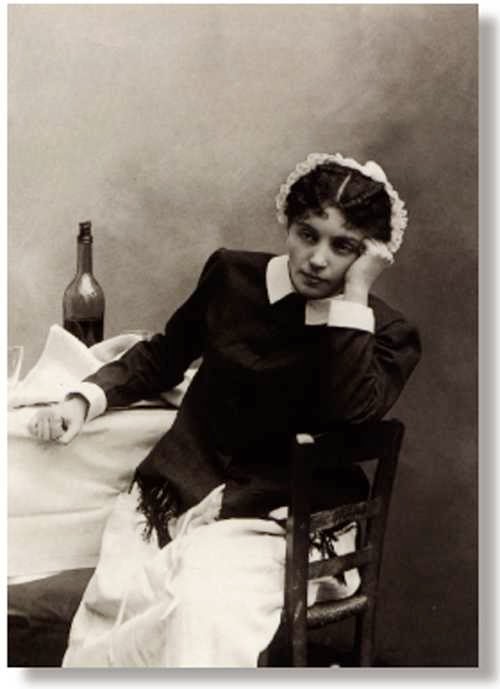by Edmond and Jules de Goncourt. Translated from the French and with an Introduction by Ernest Boyd.
New York: Knopf, 1922. First edition; copy #1367 of 3000
Edmond and Jules Goncourt--brothers, collaborative writers of French naturalism--published Germinie Lacerteux in 1865. It is about a Parisian maidservant of a lonely old woman, Mademoiselle de Varandeuil, and it is based on the Goncourts' own maid Rose Malingre.
This book is so good, in the reading of it, the mouthing of its words, the examination of sentence structure, and the swiftness with which the story takes hold of you. I love books of 19th century France to oblivion, and can't wait to read the book which put the Goncourts on eternity's map, their "Journals." To paraphrase Dorothy Parker, "I am usually a friend of pornography."
Below I've provided a few excerpts which demonstrate partially how exciting their narrative can be. Phrases like "the relics of orgy" or "that portion of her heart which slept beneath the stone" are to me as thrilling as a scream. I am sharing their phraseology with you as if it were a gift.
[Germinie had early on worked in a cafe, oftentimes accosted by the waiters.]
"the relics of orgy"
She did not dare to tell all that she suffered from her association with these cafe waiters, brazen, jocular, and cynical as they were, fed on the leavings of debauchery, polluted by all the vices to which they ministered, and blending within them all the rottenness of the relics of orgy.
[Germinie visits the cemetery.]
"that portion of her heart which slept beneath the stone"
Then she would get up, turn round as though to bid the grave that she was leaving good-bye, go some distance farther, stop again, talk in a whisper, as she had already been doing with that portion of her heart which slept beneath the stone; and her visit being thus paid to all the dead of her affections, she would return slowly, religiously, enwrapping herself in silence, and as though afraid to speak.
[When Germinie and some of her servant friends and men from the neighborhood decide to have a day in the country, with wine, food, pleasure.]
"where bits of melon rind and suicides are to be found in the underwood"
On the trees hung women's hats fastened into handkerchiefs with four pins; an artilleryman's tuft shone red every moment through openings in the leaves; cake-sellers rose amid the thickets; on the bare turf, bloused children were cutting sticks, workmen's families were trifling away the time and eating cake, urchin's caps were catching butterflies. it was one of the woods modelled on the old Bois de Boulogne, dusty and broiling, a vulgar and tawdry promenade, one of those places where the people go for an outing at the gates of capitals, parodies of forests, full of corks, where bits of melon rind and suicides are to be found in the underwood.
[Germinie's horrific time of sleeplessness and depression.]
"she succeeded in inducing periods of annihilation"
Finally she succeeded in inducing periods of annihilation which lasted half a day, and from which she emerged only partially awake, with stupefied intellect, blunted perceptions, hands which did things simply from habit, gestures like those of a somnambulist, a body and soul in which thought, will, and memory seemed to be still slumbering and dim as in the hazy hours of morning.
"the congested sleep of Drunkenness which cradles in the arms of Death"
To sleep such overwhelming sleep, to sink in the daytime into such a night, had come to be with her a truce to, and a deliverance from, a manner of life which she had lost courage either to continue or to end. A boundless yearning for nonexistence was all that she felt in her wakefulness. Such hours of her life as she lived collectedly, under self-inspection, looking into her conscience, a spectator of all her shamefulness, seemed so abominable to her! She preferred to be dead to them. Nothing in the world but sleep was left to her that would give her complete forgetfulness, the congested sleep of Drunkenness which cradles in the arms of Death.
[Toward the end of the book, Germinie is in a hospital bed.]
"a face that was ugly and good,
...like the mercy of God"
Mademoiselle asked to speak to the Mother of the Sainte-Josephine ward. A little, half-deformed sister came to her, with a face that was ugly and good, a face like the mercy of God.



